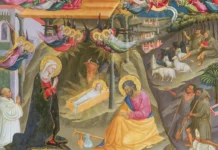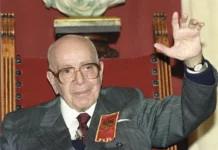Until the end of time, Our Lord will be hated with the greatest hatred in history. And His victory over this hatred, personified in the Antichrist, will once again manifest His incomparable grandeur: He will liquidate him with the breath of His mouth….
All things happen within the general providence by which God rules the universe or, in certain cases, according to a special providence. But that which concerns Our Lord Jesus Christ is regulated by a very special providence, in virtue of which His being a member of the royal house of David deserves special attention and analysis.
“Jesus of Nazareth, King of the Jews”
In order to demonstrate the scope of this factor, it would be sufficient, if it were necessary, to give the following reason alone: Providence wanted the inscription on the top of the Holy Cross to read “Jesus of Nazareth, King of the Jews,” and this bothered the high priests so much that they asked Pilate to remove it.
However, he answered: “What I have written I have written” (Jn 19:22). It was the Roman sense of domination being fully applied to the concrete case: “It is written. I am not going to remove it. Like it or not, you have to swallow it.”
I have always considered this reaction of Pilate – so acquiescent, so spineless and indecent with regard to his duty to declare Our Lord’s innocence – as a sign of his exasperation. They had obliged him, under threat of denouncing him as Caesar’s enemy, to pass an unjust sentence, and when they came to ask him to remove that sign, he answered them angrily: “No, what I have done, I have done, and that is final! At least now let me be a man.”
Whatever the case may be, INRI was forever eternalized on the immortal Cross, proclaiming: Our Lord Jesus Christ is the King of the Jews.
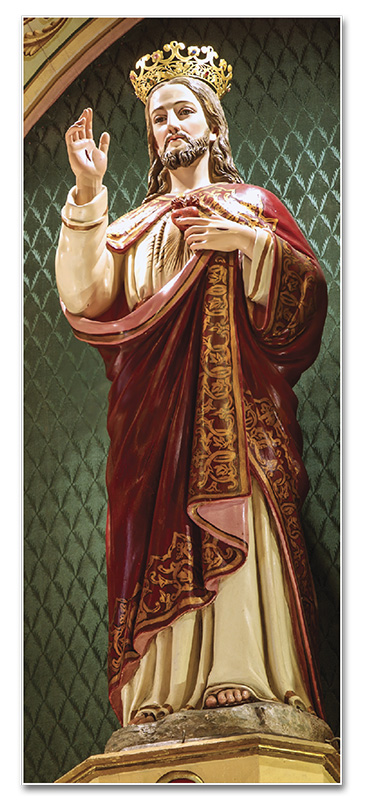
The Transfiguration on Tabor
In Christ, a temporal majesty had to shine forth, endowed with all the forms of grandeur proper to earthly kings. However, how can we see these qualities in the Saviour if He did not go about the earth as a King?
Even on Palm Sunday, when He was the object of such great homage from the people of Jerusalem, He was acclaimed as the Son of David. But they did not proclaim Him King of Israel, nor was there any attempt to remove Herod from office. Our Lord was seen as a holy and eminent Man, who possessed, among other glories, that of descending from David, but this did not lead to a desire to restore the monarchy in His person.
How, then, can we see in Our Lord the majesty and attributes of a King? At some point they had to come to light, for He came to manifest Himself fully to all men.
This royal grandeur did indeed shine forth on more than one occasion in His life, but it shone in a very special and intentional way at the Transfiguration on Mount Tabor. There He appeared in all His majesty as King and, above all, as God. And He did so in such a splendid manner that the Apostles He summoned to the top of the mountain did not want to leave: St. Peter proposed that they stay there, set up some tents and never leave (cf. Mt 17:4).
There is not a single case in history of a king who was the object of this acclamation: “Let us remain here with you. We need nothing more in the world. It is enough for us to remain looking at you.”
What usually happens is just the opposite. The subjects find the king very admirable, but they would like to say to him: “My Lord, give me a position, money, honour… I want to serve you, but I also want you to serve me. I do not want to remain standing here just to look at you. I want to be faithful; you should be also. In fact, even before serving you, I already have a list of the favours I want from you. And when I receive them, I will show them to the people in the streets of the capital, so that I too may be appreciated and admired. Living just to admire you is not enough…”
This is how it is with earthly monarchies, but not with Our Lord. When He wished to manifest His majesty, the reaction was: “Let us remain here, we need nothing other than You.”
Heart of infinite majesty
In addition to this splendid manifestation of royalty on Tabor, there was also that of Palm Sunday, alluded to earlier.
Although not greeted in this episode as King, it is evident that the people acclaimed in Him the personal majesty that the Litany of the Sacred Heart of Jesus expresses with this magnificent invocation: Cor Iesu, maiestatis infinitæ, miserere nobis. 1
What does the word heart mean here? It leads us to worship His Heart of flesh as a symbol of His soul, spirit, mentality, desires and objectives, which were of infinite majesty. All that Our Lord Jesus Christ willed was of unlimited grandeur; what He envisioned was of endless scope; in His designs, His goodness was of infinite majesty, as was also His justice.
Our Lord, however, made it clear that the manifestation of this justice was reserved for the moment of His death and for the day when He shall come, with the majesty of God and King, to judge the living and the dead at the end of time.
Majesty in Death…
Jesus Christ died under general contempt, offset by the unspeakably precious adoration of Our Lady and, in a worthy degree, but enormously less – for everything that exists, except Our Lord, is incomparably less than the Blessed Virgin Mary – by the adoration of St. John, the Holy Women and the good thief.
At the moment the Son of God commended His spirit, began what the great Bossuet – Bishop of Meaux and sacred preacher for the most eminent personages – calls “the funeral of the Son of God.”
What king ever had or will have such a funeral? The earth trembles, the sun is darkened, the veil of the Temple is rent. The graves of the righteous of the Old Testament open up and they walk through the streets (cf. Mt 27:52), rebuking all evil men, with supreme majesty, for the sins they had committed. And especially for the deicide, for it was the sin of the whole nation, consummated when the people said before Pilate: “His Blood be on us and on our children” (Mt 27:25).
…in the Resurrection…
However, the majesty of Jesus Christ is also shown when He, resurrected, appears to Our Lady. For although this is not said in Sacred Scripture, I take it for granted that when He arose from the dead, He was with Her before He revealed Himself to any other creature. The tomb was broken open, the Angels threw the stone sealing the tomb to the ground and He emerged (cf. Mt 28:1-3), with all the scars of the Passion shining like suns! And all of His manifestations following the Resurrection were clothed with this note of majesty.
For example: Jesus enters, no one knows how, into the place where the disciples were gathered (cf. Jn 20:19). The closed doors and windows were of no avail, for He was in His glorious Body, and He passed through them. What majesty, to enter through a wall without destroying it! Many kings in history have knocked down walls… To pass through them without having knocked them down, only the King Jesus Christ!
He appears so kind, so loving, but instilling such fear, that His words are: “Peace to you! See My hands and My feet, that it is I Myself” (Lk 24:36,39). As if to say: “Do not be afraid, it is I, grandeur!”
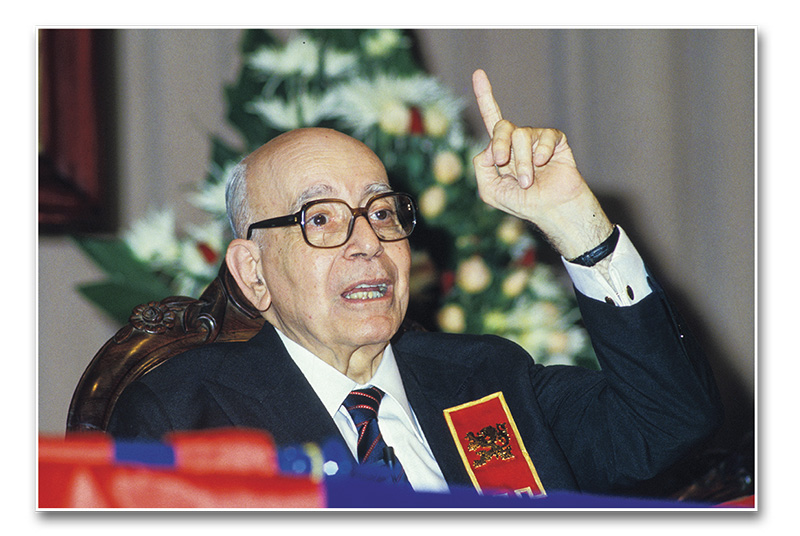
…and in the Ascension
Indescribable, as well, is the grandeur that must have transpired in His Ascension! As He spoke, He was slowly ascending. As He drew nearer to Heaven by His own power, and not carried by Angels, He became more brilliant and majestic!
At a certain moment, He disappears. One can imagine the joy of the Blessed Virgin Mary at seeing glorified the Son whom She had seen so humiliated! On the other hand, however, what sadness She must have been experiencing interiorly due to the separation…
Nevertheless, there was one more consolation for Our Lady. I have a very strong and pronounced impression that God did not refuse Her a grace granted to many saints: they loved the Blessed Sacrament so much that, at a certain moment in their lives, the Sacrament of the Eucharist never ceased to be present in them. They received Communion and the Sacred Species remained within them until the following Communion.
This was the case, for example, of St. Anthony Mary Claret, founder of the Congregation of the Missionary Sons of the Immaculate Heart of Mary, who lived in the 19th century. He was a living tabernacle of the Eucharistic Jesus.
Now, if during the period of gestation Our Lady was the living tabernacle of the Word Incarnate, would He not have maintained this privilege when He departed for Heaven? At least from the time of the first Mass, I believe that Our Lord never ceased to be present in Mary.
After the Ascension, she certainly must have thought: “He is in Heaven, and He is also here!” The Apostles, for their part, certainly thought about celebrating the following day and receiving Him, for a longer or shorter time, in their hearts. Thus, the Eucharistic Presence began to console the Church for this long separation of many thousands of years, which will cease when He comes on the day of the Last Judgement.
Can a regal grandeur comparable to this be imagined? And yet there is still more.
Grandeur in the worst humiliations
It has been explained how Our Lord was adored in His splendour. But this is not all.
His enemies, wanting to ridicule Him, subjected Him to the humiliations of the Passion. He drank the entire chalice of every possible sorrow and ignominy from beginning to end. The executioners could not imagine that, over the centuries, every outrage suffered by Him would be venerated, and that, before images depicting Him seated with the crown of thorns, clothed in the cloak of derision and holding a fool’s rod in His hand, the greatest sages would kneel and be brought to tears.
The most powerful kings would take it as an exaggerated compliment to be compared in any way to this King seated on the throne of fools. He would lend such dignity to the Cross upon which He had been nailed that, from atop all the crowns of Catholic nations, it would be the sign of glory.
That is to say, no one has ever come even close to the greatness of Our Lord, both in times of glory as well as the moments of the worst humiliation. And even on these occasions He showed incredible signs of power, such as to the good thief. He canonized him on the height of Calvary, promising him, as King of Heaven and earth: “Today you will be with Me in paradise” (Lk 23:43).
Note that the promise is not: “Today you will be in Paradise.” Jesus knew that if He did not say “you will be with Me,” the promise would not be complete, for Paradise without Our Lord would not be Paradise. What royalty!
If He was not great, who was?
On one occasion, a sceptical French historian made this comment: historians often overlook the figure of Our Lord Jesus Christ. Now, I ask them: what man, throughout the course of history, has managed to have so many others kneel with such humility before His image, considering it an honour to do so? If such a Man is not worthy to enter history, what is the purpose of history?
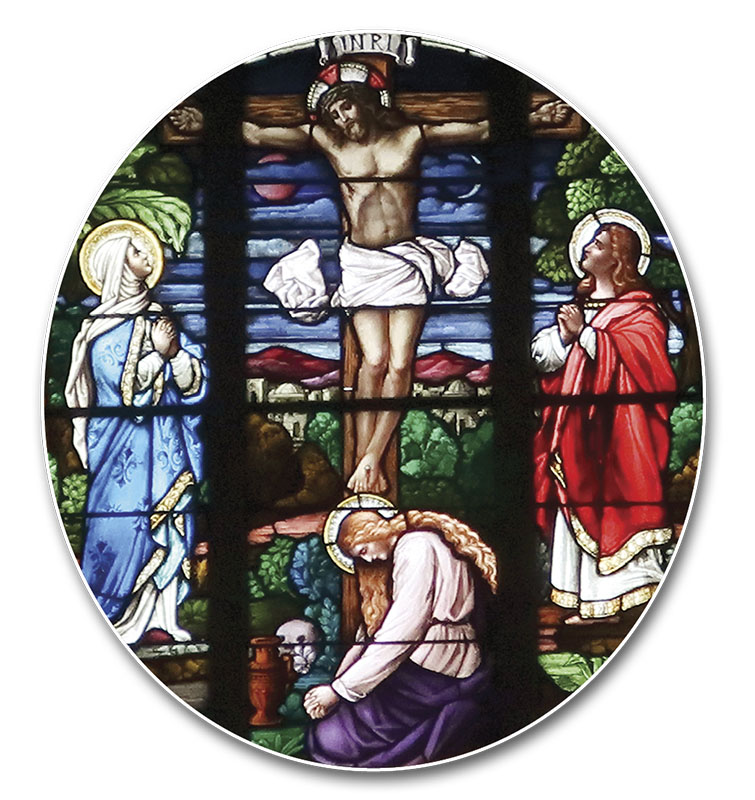
The textbooks used in colleges and universities deal with all sorts of things, but not with Jesus Christ. However, Our Lord is the centre of history. If He was not great, who was?
One might object: “Dr. Plinio, it is simple. You, led by your enthusiasm, are skirting the following difficulty: there is proof of the existence of Caesar, Charlemagne and Napoleon. But who can prove that Jesus existed?”
Well, it is the most certain historical existence there is! All the reasons by which we believe that Caesar existed lead us to believe that Jesus Christ also existed!
An imbecile once asked me, “Where are the originals of the Gospels?” I could have said: “The Catholic Cause would be very poorly served if served by you! Because, if there were somewhere a pile of scrolls supposedly containing the originals of the four Gospels, who could guarantee us that they were, in fact, authentic?” They could be objects of reverence, or of historical research like any other ancient document, but not a proof of our Faith. For this, it would be necessary to prove that those proofs were proofs.
On the other hand, I ask: where are the originals of Cicero’s Catiline Orations? And yet, who doubts that Cicero existed and that he is the author of those Catiline Orations? No one, due to a series of historical arguments – which, in the case of Our Lord, are superabundant.
The greatest hatred in history
Mediocre people do not arouse hatred. There is a form of regal grandeur in being hated as Jesus Christ was, even after death. Even in this He was and is incomparably great.
Our Lord will be hated with the greatest hatred in history until the end of the ages. And when the Antichrist comes, He will be a kind of personification of this fury against Our Lord. However, the final victory over the Antichrist will be achieved in an unprecedented way for any king: “The Lord Jesus will slay him with the breath of His mouth and destroy him by His appearing and His coming” (cf. 2 Thes 2:8).
He does not need to lay even a finger on him; a breath is enough! With the enemy reduced to dust, history ends and the Judgement begins! ◊
Taken, with adaptations, from: Dr. Plinio. São Paulo. Year XX. N.236 (Nov., 2017); p.12-17
Note
1 From the Latin: “Heart of Jesus, of infinite majesty, have mercy on us.”



